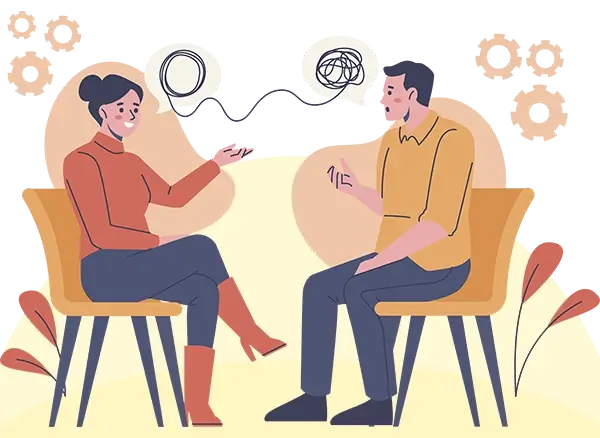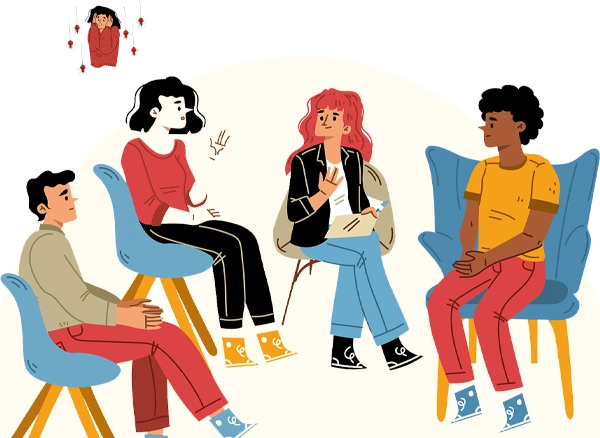Learn whether you may be living with Autism with this expert-reviewed test. After receiving your results, you’ll have the opportunity to learn more about your symptoms and talk to a licensed therapist.
Begin TestThis mental health assessment is not a diagnosis or a substitute for licensed therapy. You can schedule with a qualified mental health professional here.
Around 3.2% of children in the U.S. have been diagnosed with Autism, although many experts believe the prevalence of Autism could be higher as many people go undiagnosed until adulthood. How do you know if you have Autism, or are on the Autism Spectrum? The only real way is to get a diagnosis from a mental health professional. However, this free, online Autism screening tool can help you assess the likelihood that you have Autism. The questions are pulled from DSM-5 criteria and are therefore a good tool to understand your behaviors, emotions, and reactions. Remember, Autism is a complex disorder that cannot be summed up by these 10 questions.
Begin Test
There are many aspects of Autism. Autism in one person may look very different from autism in someone else. In general, people with Autism will struggle with communicating, social interactions, and handling adverse sensory stimuli. However, unlike other mental illnesses, Autism is not considered an illness, but rather a neurodivergence. People who have Autism have brains that work differently from people without Autism, and this difference can cause some extra challenges and require extra accommodations and support to be met, but it does not mean they have an illness or disease.
Researchers don’t know the exact cause of Autism. There is likely a strong genetic base, with the environment (both pre- and post-natal) playing some role as well. Autism is known to run in families, so if you have parents or grandparents with Autism, you are more likely to have Autism as well.
Autism is a chronic and lifelong disorder, with most people experiencing symptoms for their whole life. Treatment for Autism is not geared towards curing Autism, but rather finding ways for the autistic person to live as independently as they can. This might mean learning different coping mechanisms, how to communicate and lean on your support system, and extra skills or behaviors that may come naturally to people without Autism and are an important part of existing in society. Talk therapy can be an effective treatment for people with less severe Autism (sometimes called “high functioning” Autism), but other hands-on approaches are better suited for those with higher needs.
Remember that this assessment is not a substitute for a licensed mental health professional screening you for Autism. You may have experiences that align with Autism but are out of the scope of this short test. Therefore, it is wise to always seek an outside, professionally licensed opinion in addition to this test.
Autism can be a very isolating experience. It can feel like no one else understands what you’re going through. You are not alone. There are communities of people with Autism you can join, and a therapist trained in Autism can help you meet your goals.
Find a Therapist

High-functioning autism, previously called Asperger's and sometimes called Level 1 autism, is the least severe autism. Although people with high-functioning autism may struggle in social situations and have some sensory difficulties, they are largely able to live independently with the help of coping mechanisms. They usually do not have large verbal or cognitive difficulties.
If you notice ongoing differences in how you communicate socially, experience sensory input, or show repetitive behaviors that impact your daily life, you might be autistic. A formal diagnosis requires evaluation by a qualified professional, like a psychologist, psychiatrist, or developmental specialist. They will examine your developmental history and behavior patterns.
You can also take free, online autism tests to see how your symptoms compare to the DSM-5 definition of autism.
Life with autism can vary greatly from person to person. Many autistic individuals face sensory sensitivities, social challenges, or a strong focus on specific interests. With the right support, adjustments, and coping strategies, autistic people can thrive in relationships, careers, and daily activities. Understanding, acceptance, and self-awareness are essential for navigating the world.
5 common signs of autism include:
Social differences - Difficulty interpreting social cues, keeping conversations going, or understanding other people's feelings.
Communication differences - Challenges with verbal or nonverbal communication, including tone, gestures, or facial expressions.
Repetitive behaviors - Engaging in repeated movements, routines, or rituals.
Intense interests - A strong focus or passion for specific topics or activities.
Sensory sensitivities - Over- or under-reacting to sounds, lights, textures, or other sensory input.
These are not the only symptoms of autism but represent the most common sets of symptoms.
The most effective way to determine if you might have Autism is to talk to a licensed professional. A psychologist can conduct a series of questionnaires, interviews, and possibly observational tasks to help with a formal diagnosis. You can also use our online assessment as a guide for some of the most common symptoms associated with Autism. If you feel as though you have a presentation of several of these symptoms, it may be worth it to schedule a time to meet with a psychologist for more formal testing and information.
“Can you cure autism?” is a common question.The answer to that is there is no cure or even one treatment plan that works for everyone. Autism is a lifelong diagnosis. Managing the symptoms of Autism will look different for everyone. Some possible treatment plan options include Cognitive Behavioral Therapy, which works on changing the patterns of behaviors, medications, and other types of therapy. The truth about treating Autism is that the individual has to find the combination of treatment options that best works for them. Reach out to one of our qualified Lifebulb therapists today for help with finding a customized plan to meet your needs.